How to have healthy meal plans
Healthy meal plans
Healthy meal plans are the diets that help you maintain and improve the overall health of the body.

The healthy meal plans provide the necessary nutrients, adequate fluids, amino acids and essential fatty acids, enough vitamins and minerals, as well as calories for the body.
Healthy meal plans provide you with basic body requirements without causing overweight and disease. Also, healthy meal plan plus exercise can reduce your risk of developing diseases such as obesity, heart disease, type 2 diabetes, high blood pressure and cancer.Contrary to what many people think, having a healthy diet can be very simple and easy.
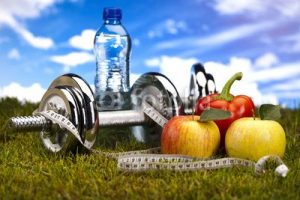
The basis of healthy meal plans
The diet includes the followings which provides all the nutrients that your body needs:
- Starchy foods such as potatoes, rice and pasta plus
- A large amount of fruits and vegetables
- Number of proteinuria such as meat, fish
- A little dairy
- A small amount of fat
- Salt and sugar
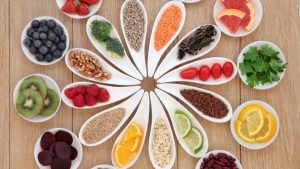
When it comes to healthy meal plans the main key balance is to access it.Balance means eating a right amount of a wide variety of foods and consuming the right amount of foods and beverages that will help you achieve a healthy body and keep it healthy.
Groups and foods that make up healthy meal plans:
We can divide all foods that we use in five groups, to have a healthy diet, try to choose a wide range of foods from the first four groups.
- Fruits and vegetables
- Starchy foods, such as bread, rice, potatoes and pasta. As much as you can use whole grains and eat potatoes to absorb more fiber with skin
- Meat, fish, eggs and beans
- Milk and Dairy
- Foods containing sugar and fat
Fruits and vegetable: Fruits and vegetables are vital sources of vitamins and minerals. It is recommended that people should eat fruits and vegetables five times a day. Research shows that people who eat at least five times of fruits and vegetables per day reduce the risk of heart disease, stroke, and some types of cancer. Eating 5 times of fruits and vegetables the way you think is not hard, an apple, a banana, a peach or a fruit of the same size can be used as a meal. A slice of watermelon or melon is another meal. 3 table spoons of vegetable can be another meal out of these five meals.
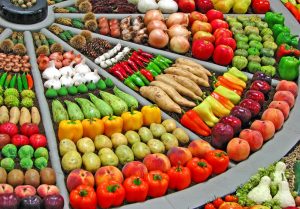
Starchy foods: This type of food should be one third of the food we eat. So starchy foods are one of the essential ingredients of our healthy diet. Potatoes are one of the best choices and it is in a rich fiber source. As long as you can, keep the peel of the potato because of the fiber and vitamin in it. Try to eat whole grains or branny whole grains such as brown rice, wholegrain pasta and wholegrain bread. All types of bran have more fiber and vitamins than white cereals.
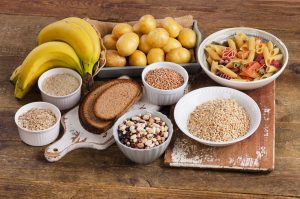
Meat, fish, eggs and beans: These types of foods are rich in protein that is essential for the growth and repair of the body. Also, these foods are good sources of vitamins and minerals.Meat is rich in vitamins and minerals such as zinc, vitamins B and iron.Try to consume thin and low-fat pieces of white meat and red meat, and let it be cooked completely. Fish is another rich source of protein and contains a large number of vitamins and minerals. Fatty acids are rich in omega-3 fatty acids. Try to eat at least two times of fish a week.
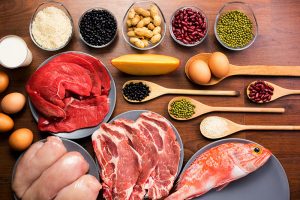
Milk and Dairy: Milk and other dairy products such as yogurt and cheese are another good source of protein and calcium. Try to use low-fat milk and dairy products to keep yourselves healthy.
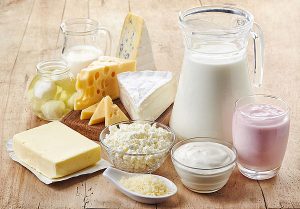
Foods containing sugar and fat: In most people, fat and sugar consumption is high. Fat and sugar both are sources of supplying energy for the body. But when we use them a lot, we absorb more energy than we need and so we become obese. Obesity can increase our risk of developing type 2 diabetes, heart disease, stroke, and certain types of cancer.
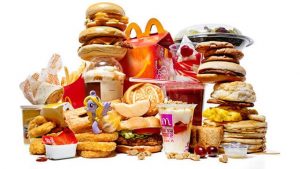
Fats consist of two kinds of saturated fat and unsaturated fat. Saturated fats are found in foods such as cheese, sausage, butter, cake, biscuits and sweets. This type of fat can increase blood cholesterol and thus lead to heart disease. But unsaturated fats, are lipids that can reduce cholesterol levels and provide the fatty acids we need to maintain our body’s health. Fatty fish, nuts and seeds, avocado, olive oil and vegetable oil are sources of this fat. For being healthy, reduce the use of saturated fats and use small amounts of unsaturated fat instead of them.Sugar is found naturally in foods and, for sure, there is no need to reduce this type of sugar, instead, you should reduce and control the amount of foods and beverages that make up sugar, such as drinks, cakes, biscuits, chocolates, ice cream and jam.
Healthy diet according to World Health Organization (WHO)
The World Health Organization (WHO) announces the following five diet-related issues:
- Get your calories and energy to the extent that your body spends calories.
- Increase vegetarian consumption, including fruits, vegetables, legumes, whole grains and nuts.
- Limit the consumption of fats and use a variety of unsaturated fats instead of saturated fats and trans fat.
- Restrict sugar consumption in your diet.
- Limit your body’s sodium and salt intake and ensure that it is iodized when salt is consumed.
A Healthy Diet according to the Harvard School of Public Health
The Harvard School of Public Health provides 10 recommendations for a healthy diet:
- Use good types of carbohydrates such as whole grains, vegetables, fruits and legumes, and avoid using white bread, white rice, sweets and sweets.
- Use enough proteins from fish, poultry, nuts and legumes to try to avoid red meat.
- Choose foods that contain healthy fats, such as vegetable oils, nuts and fish, and reduce trans fat and saturated fats.
- Choose a high-fiber diet, which includes whole grains, vegetables and fruits.
- Eat more fruits and vegetables, the more colorful and diverse these fruits and vegetables are, the better.
- Calcium is very important, but milk is not the best source. Good sources of calcium include cabbage, soybean milk, cooked beans and calcium supplements and vitamin D.
- Water is the best source of supplying fluids for body. Avoid drinking sugary drinks and restrict the use of juice and milk. We recommend energy drinks only for people who exercise and their body needs it.
- Limit salt intake and use fresh foods rather than fast foods.
- Daily intake of multivitamins and vitamins D can be beneficial.
- Regular exercise and fitness maintenance are recommended.
